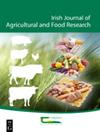生物刺激剂对冬油菜和冬小麦抗寒性和生产力形成的影响
IF 1.4
4区 农林科学
Q3 AGRICULTURE, MULTIDISCIPLINARY
引用次数: 10
摘要
摘要本研究旨在探讨生物刺激素对室内低温条件下冬小麦和油菜抗冻性的影响,以及对油菜和冬小麦生长发育、越冬和产量的影响。采用形态计量学方法,对含有生物刺激剂Ruter AA、Terra Sorb和Razormin的游离氨基酸、大量元素和微量元素在油菜籽“Hornet H”和冬小麦“Skagen”和“Kovas”品种上的影响进行了测试。研究发现,在可控冷胁迫条件下,对BBCH 13-14期的油菜籽和BBCH 14-15期的小麦施用生物刺激素可提高幼苗的抗冻能力。与小麦幼苗相比,生物刺激素能更有效地提高油菜幼苗在-5℃下的抗冻能力。-7℃的温度对油菜幼苗是致命的,而小麦幼苗在生物刺激素的作用下,其抗性较对照幼苗有所增强。在自然田间试验中,这些生物刺激物对植物秋季生长、适应寒冷、植物越冬、植被更新以及因此而形成的生产力要素产生了显著影响。Razormin (200 mL/ha)、Terra Sorb (2 L/ha)和Ruter AA (1 L/ha)对冬小麦生长参数的影响显著高于对冬油菜的影响。本文章由计算机程序翻译,如有差异,请以英文原文为准。
Effect of biostimulants on cold resistance and productivity formation in winter rapeseed and winter wheat
Abstract The aim of the study was to investigate the effects of biostimulants on the resistance to freezing under laboratory-controlled cold conditions and on the growth, development, overwintering and productivity of winter rapeseed and winter wheat in natural field experiments. The effect of free amino acids, macroelements and microelements that contain biostimulants Ruter AA, Terra Sorb and Razormin was tested on cultivars of rapeseed, ‘Hornet H’, and winter wheat, ‘Skagen’ and ‘Kovas’, applying morphometrical methods. We found that biostimulants applied to rapeseed at BBCH 13–14 stage and to wheat at BBCH 14–15 stage under controlled cold stress conditions increased the freezing tolerance of seedlings. Biostimulants more actively increased the freezing resistance of rapeseed seedlings at –5°C compared to that of wheat seedlings. The temperature of –7°C was mortal to rape seedlings, while the resistance of wheat seedlings increased under the influence of the tested biostimulants compared to that of the control seedlings. In natural field experiments, these biostimulants produced a significant effect on plant growth in autumn, acclimation to the cold, plant overwintering, vegetation renewal and, due to this, formation of productivity elements. The effects of Razormin (200 mL/ha), Terra Sorb (2 L/ha) and Ruter AA (1 L/ha) were significantly higher on growth parameters of winter wheat compared to the productivity of winter rapeseed.
求助全文
通过发布文献求助,成功后即可免费获取论文全文。
去求助
来源期刊
CiteScore
2.50
自引率
20.00%
发文量
23
审稿时长
>36 weeks
期刊介绍:
The Irish Journal of Agricultural and Food Research is a peer reviewed open access scientific journal published by Teagasc (Agriculture and Food Development Authority, Ireland). Manuscripts on any aspect of research of direct relevance to Irish agriculture and food production, including plant and animal sciences, food science, agri environmental science, soils, engineering, buildings, economics and sociology, will be considered for publication. The work must demonstrate novelty and relevance to the field of research. Papers published or offered for publication elsewhere will not be considered, but the publication of an abstract does not preclude the publication of the full paper in this journal.

 求助内容:
求助内容: 应助结果提醒方式:
应助结果提醒方式:


